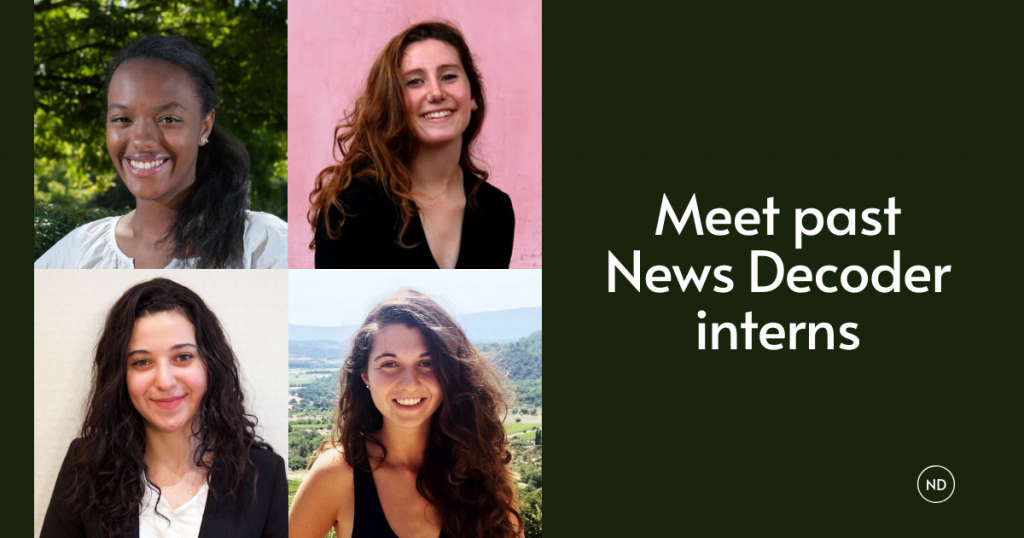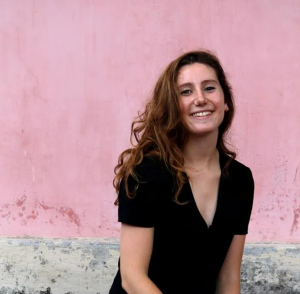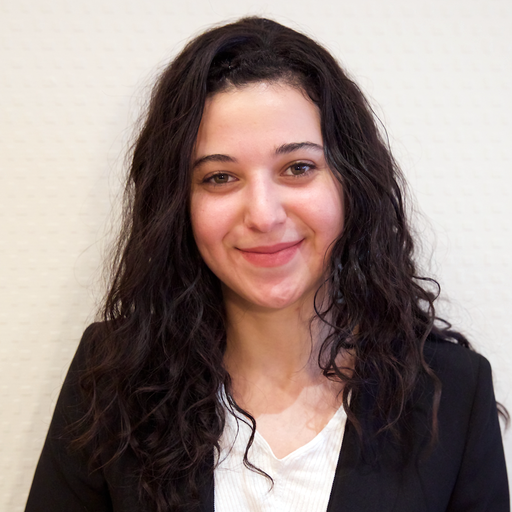They have helped shape News Decoder from the start. Meet our far-flung interns.

They have decoded Brexit, rebuilt New Decoder’s website and dug into the Paris metro system.
From our launch five years ago, interns have shaped New Decoder by helping us reach young people from around the world with our message of tolerance and understanding.
And as we approach our fifth birthday, we talked to four former interns — Emma Bapt (2016), Tania Bagan (2017), Maryam Touimi Benjelloun (2018) and Amari Leigh (2019) — about their time in Paris, what they learned at News Decoder and their plans for the future.
Despite uncertainties surrounding COVID-19, all four have ambitions for the near future: to work for the European Union, road-trip across the United States, pursue graduate school in Stockholm and tackle a career in journalism.
News Decoder salutes each of these interns, including our first, Pauline Bock, who helped launch our website in mid-2015 and has since gone on to write for WIRED, The New Yorker and New Statesman.
Emma Bapt: Being sensitive to nuances of global issues

What was your biggest takeaway from News Decoder?
My internship at News Decoder in the summer of 2016 was my first professional experience. The most meaningful work I did was working with students and expert correspondents on redrafting, editing and fact-checking news stories to help “decode” global issues. This drove me to create the News Decoder Society at King’s College London when returning to university for my second year, which served for two years as a hub for dozens of KCL students to write pieces for the ND website, participate in monthly webinars and promote the ND project on campus.
What are your current/future projects?
Current and future projects at this stage are somewhat on hold given the coronavirus pandemic. Whilst my second year as an MA student in Washington DC scheduled for the fall is not confirmed, I hope to complete my MA course next summer. After Johns Hopkins School of Advanced International Studies (SAIS), I will be looking at fieldwork experiences in conflict zones as well as opportunities to work in an EU institution, intergovernmental organizations such as the Organization for Security and Co-operation in Europe and think tanks. My time at ND has proved fundamental in building my confidence to work and develop my areas of interest, as well as constantly being open to new ideas and opportunities and remaining sensitive to the infinite nuances of global issues.
What was unique about your internship/experience at ND?
My experience at ND, as well as the partnership between News Decoder and King’s College during my time there, was and will remain truly unique. In working with ND, I have truly admired its developments over the years and the refining of the ND project and mission objectives.
I am especially grateful for the mentorship I received and continue to receive from ND’s founder, Nelson Graves. It was Nelson who suggested the SAIS MA program some four years ago, the importance of diversifying my skill set and looking out for opportunities at all times.
Tania Bagan: Students, the great questioners

What was your biggest takeaway from News Decoder?
The sheer amount of information I accumulated while I was at ND, through research, interviews and thorough fact-checking, was the most important takeaway for me. Writing for ND, I was constantly collecting and analyzing information, learning to differentiate between fact and “fake”. This process really taught me how powerful and easily manipulable information is and instilled in me how important it is to always question and investigate information that is presented to us as being truth.
What are your current/future projects?
You could say my career plans are mostly on hold during these uncertain times. I plan on road-tripping across the U.S. with my boyfriend in the fall — I’ve really only seen the East and West Coasts — and hope to make my way back to Italy, where I’m from, after that. I’m currently looking into different Master’s Degree programs in Italy. There are a lot that interest me, in fields ranging from editorial work to non-profit management.
You were involved with the Free Library of Philadelphia. What have been your most meaningful experiences working with children and teens? Is there a place for journalism in K-12 education?
Working with kids this past year has been extremely fulfilling. They are so eager to learn and so creative.The after-school program I lead has been suspended because of COVID-19, but I hope to continue working in education at some point in the future. There is definitely a place for journalism in American schools. Educators should capitalize on young peoples’ natural tendency to question everything they hear — that’s a solid foundation for a journalist.
Maryam Touimi Benjelloun: Be “digital nomads.”

What was your biggest takeaway from News Decoder?
The most meaningful work I did at News Decoder was to make the process of using the website a little easier for the rest of the team and, hopefully, a little more enjoyable, too! Uncovering the ways technology can further propel your business is extremely important. Without a working knowledge of that process, many important features can be easily missed, especially when running a non-profit or NGO. In other words, it can be very resourceful to “befriend your technology” and further discover what else your platform can do. Witnessing the team’s engagement with the various trends in tech today, even after my time with them ended, made me very happy.
What are your current/future projects?
I’m currently working as a Frontend Developer with Mozilla’s Open Lab, building an online platform for women mentorship. At News Decoder, my role involved a wider scope than that of a developer. Namely, I participated in consulting, research and digital strategy, which inspired me to pursue more of that in my career. I love the intersection between business, engineering and design, and I’m excited to pursue a Master of Arts degree in Digital Management at Hyper Island Stockholm, which will further enhance my learning of digital strategy, while I continually maintain the core role of an engineer.
What role do you think technology and web design play in ensuring the survival of news organizations? From your experience, is it different being a developer for news organizations than other types of organizations?
Technology is undoubtedly moving at a very fast pace and disrupting many industries at the same. Back in the day, the daily news was delivered by a paperboy or girl, and the reach of that content was very limited. Today, any news organization has the power to reach anyone who uses the internet. In terms of survival, any news organization must be a digital nomad or at the very least have a working fluency of technology. Addressing topics such as Search Engine Optimization, performance, speed and design are all critical points for both reach and user retention.
The main difference between a news organization and a SaaS (Ed – Software as a Service; maintain databases, servers and applications) company, for instance, is that you will have much more text on a page, which in my opinion can be more challenging in delivering a sustainable session duration period. This was the main difference in my experience when I worked as a Frontend/Fullstack developer at News Decoder, and increasing user retention by 40%-60% was one of my proudest achievements.
Amari Leigh: Solidifying my love for journalism

What was your biggest takeaway from News Decoder?
During my time with ND, the most meaningful piece that I worked on was the article and short video on the Paris metro system. It was also definitely the most challenging piece I worked on that summer. Growing up in a big city, public transportation has always played a huge role in my day-to-day, so it was really fun to experience public transit in a different city. During my short stay in Paris, I noticed that there were a lot of changes happening underground, and the delays and construction on my local metro line definitely affected how I moved around the city that summer. When brainstorming article ideas with Nelson, he suggested that I write about something that I was experiencing, and quickly I thought of doing a piece comparing the subway system in my hometown of New York with the metro system in Paris. I was fascinated with how public transportation is a space where people from all walks of city life interact, and I wanted to capture that through a visual medium. Personally, it was a challenge to shoot the footage, produce the segment and learn how to edit in Adobe Premiere, but it was ultimately super rewarding.
What are your current/future projects?
Currently, I am finishing my junior year at Hamilton College, where I’m managing editor of the school newspaper. I definitely use all of the skills Nelson taught during my summer at ND when I’m writing my own pieces or editing work written by other students. I also am interested in pursuing a career in journalism, and for me this interest was solidified during my summer with ND. One of the pieces I worked on during my internship was the “On the Front Line” series where I wrote profile pieces on different ND correspondents and their lustrous careers in journalism. I just loved all of the amazing stories they had to share about their job. It was really inspiring to learn and write about their careers and definitely highlighted to me the important and exciting role that journalists play.
I see you interned for the Malala fund. How has your journalistic background impacted your role at the Malala fund?
I worked as the editorial intern at Malala Fund for the first semester of my junior year, from September to December 2019. It was such an incredible opportunity where I was able to apply and expand upon the skills I learned from Nelson and the ND team. I loved being an ND intern because it was a super hands-on experience where I learned so much about journalism, from the logistics of how to input things into WordPress, devising a good title to editorial content, identifying what makes a good story and asking good interview questions. My summer with ND definitely prepared me for my role as editorial intern at Malala Fund and for all future opportunities, just as they are preparing other students around the world.
Are you interested in News Decoder’s internship opportunities? Reach out to us!

Dylan Carlson-Sirvent is an intern at News Decoder. He currently lives in Paris, where he is learning French and taking guitar classes. Carlson-Sirvent will start his university studies at Yale College later this year. He loves reading, playing music and learning languages.
